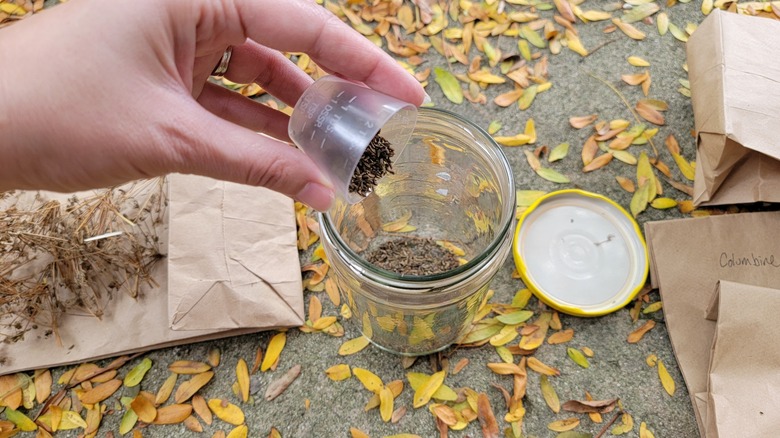Why You Should Reuse Glass Jars From Around Your Home For Seed Storage
Savvy gardeners know all about the seeds they should be harvesting from their gardens and replanting. The benefits are clear; seed saving boosts your gardening budget because you can forgo buying commercial seeds and ensures the longevity of your best plants. However, it takes considerable effort to collect and dry these kernels of regeneration, and it's important to ensure that whatever you store the seeds in will keep them viable until the next season. Keeping glass jars from canning, mayonnaise, baby food, or spices in your home instead of sending them to the recycling center means you won't have to spend a dime on your seed-saving efforts. The seeds, after all, are already free, and now so are the containers you're storing them in.
Additionally, they come in an enormous range of sizes suitable for everything from tiny lettuce and carrot seeds to hefty bean seeds and seed packets. The transparent walls allow you to see inside at a glance, and the tight screw-on or rubber-sealed flip-top lids keep out pests and seed-ruining damp air. What's more, they come expertly recommended and backed by science. If glass Kilner jars, for example, are good enough for the Millennium Seed Bank at Kew and commercial seed suppliers, they're good enough for us, too! Researchers behind a 2021 study published in Gontor Agrotech Science Journal found that rice seeds stored in glass jars grew better than those stored in other materials, like plastic and metal.
How to save seeds from your garden in up-cycled jars
Glass jars have downsides worth noting, too. They're heavier than paper, plastic, and even some metal alternatives, can shatter if dropped, and take up a lot of space on a shelf. Static electricity can build up in the jar, causing feather-light seeds to stick to the sides when you try to get them out. Due to their weight, you need sturdy shelves to store them on. Still, just on numbers, the pros of using glass jars for seed saving far outweigh the cons — especially when you realize that it couldn't be simpler to use jars to store garden seeds to keep them fresh for as long as possible. Up to five years for many seeds, in fact!
Wash even new jars with warm, soapy water and leave them to air dry or run them through the dishwasher. You could also try this simple oven trick to sterilize your jars in no time. Likewise, the seeds need to be completely dry and free from leaves, stems, and dirt before storage. Organize the seeds in each jar — for example, put seed packets containing different lettuce cultivars together in one jar or allocate a jar to each planting month or season — and label individual packets and jars with the date and variety (or species) so you don't forget what you have. Place some sort of drying agent inside the jar — a silica gel packet, milk powder bundled in cheesecloth, or a few uncooked grains of rice — and seal it shut. Store the jars in a dark, cool part of your home (32 to 41 degrees Fahrenheit) or your fridge or freezer.
